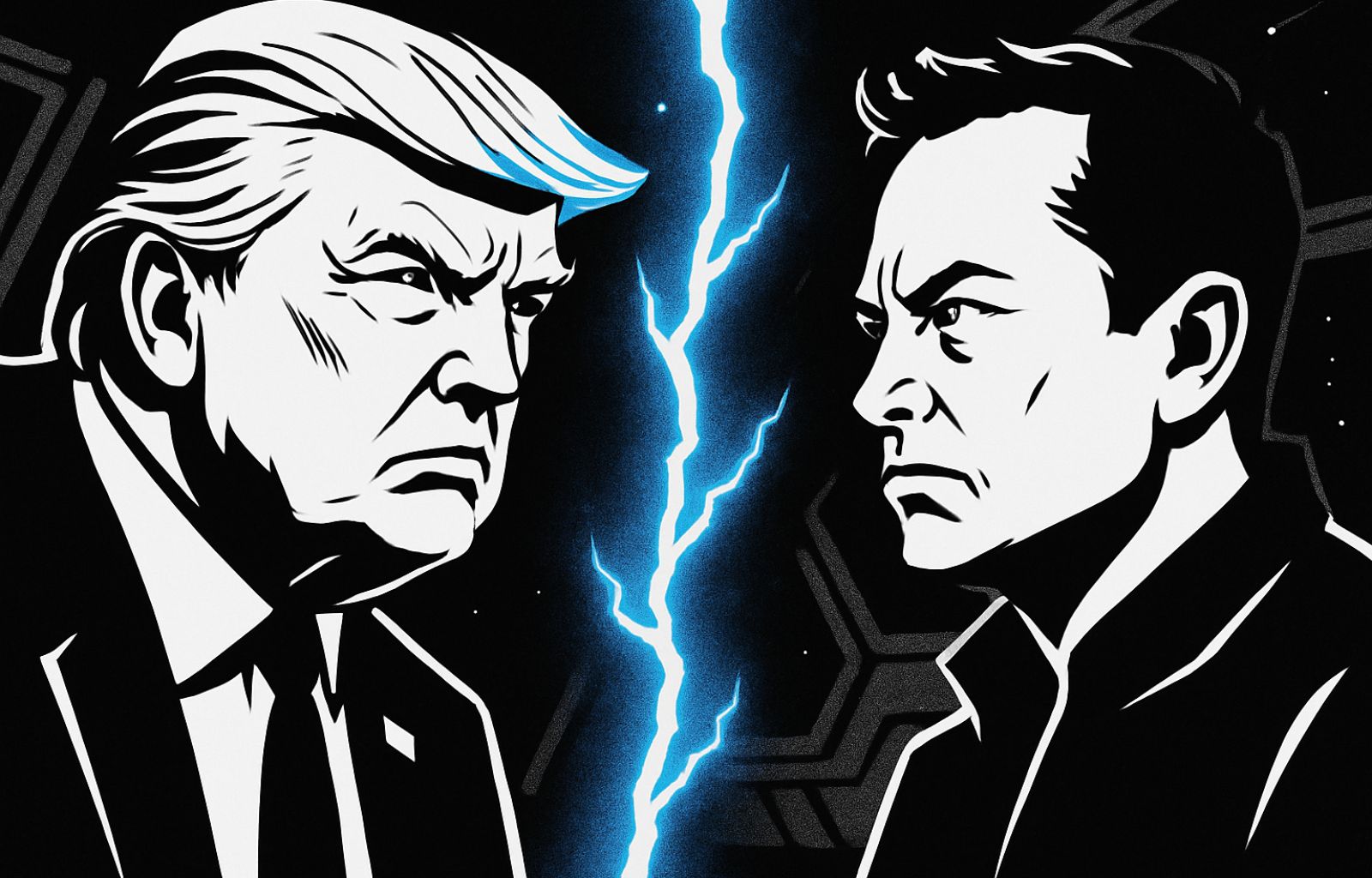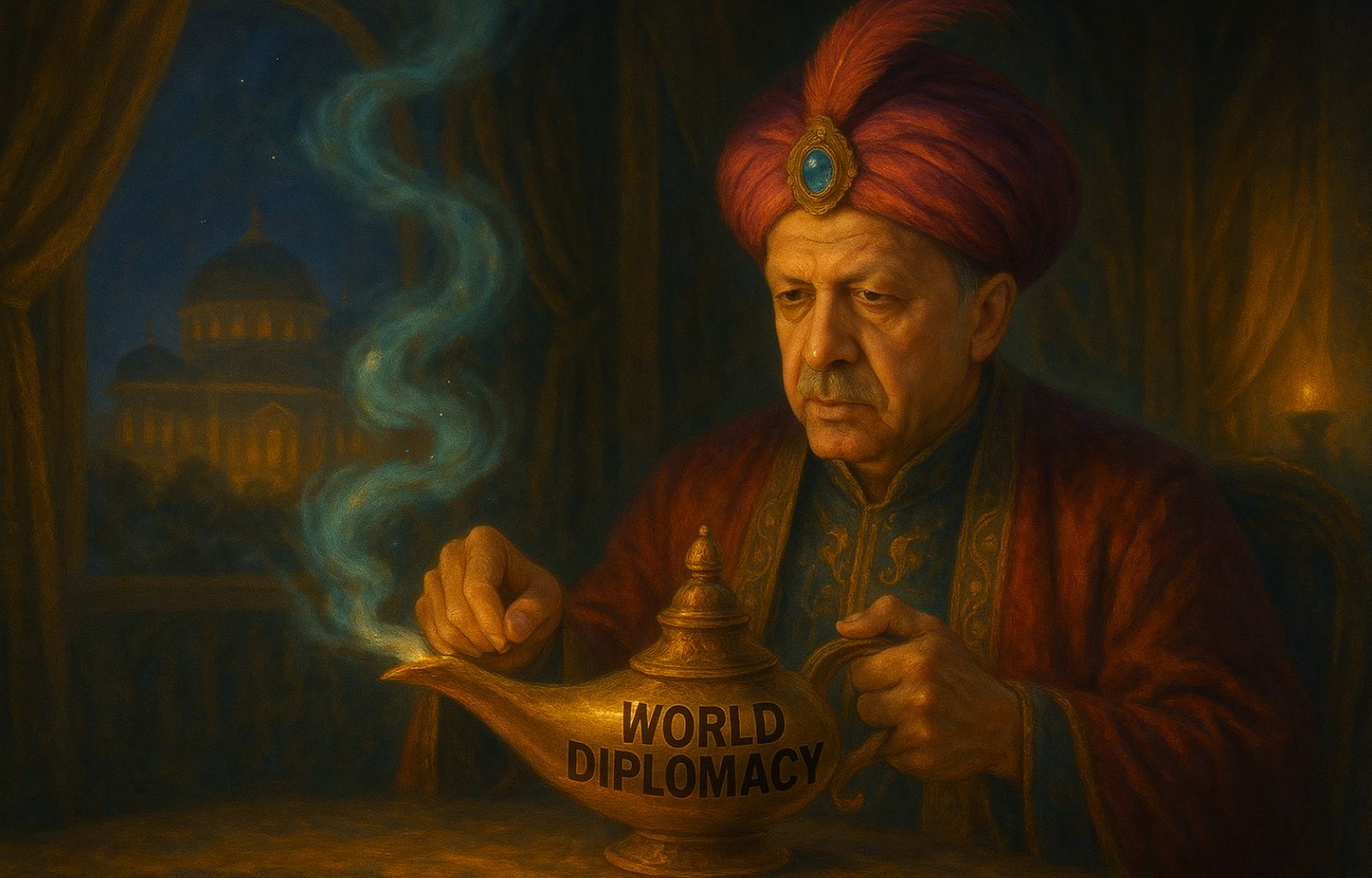Trump-Musk Armageddon. When power destroys power

Over the past few years, Elon Musk has gradually transcended the boundaries of industry to take an increasingly central role in American politics. From his visits to the White House to his outbursts on X (formerly Twitter), via his leadership of the Department of Government Efficiency (DOGE), the entrepreneur’s public trajectory has oscillated between building his own sphere of political influence and attempting, more or less successfully, to steer the agenda of Donald Trump and the Republican Party.
What began as a tactical alliance between a billionaire in search of power and a party in search of innovation has turned into a dangerous experiment in de facto co-presidency. A union of excesses, tensions, opposing narcissisms. But as often happens in marriages of interest, the cohabitation proved more fragile than expected. And today, with the announcement of Musk’s exit from the scene and the explosion of the personal and political rift with Trump, we can begin to read against the light the signs of a systemic crisis between business and government, communication and politics.
Musk’s exit is not just the step backwards of an overexposed businessman. It is the demise of a hybrid model in which economic power claimed to dictate the timing of politics. But above all, it is the reflection of a communicative miscalculation: believing that digital popularity and entrepreneurial genius were sufficient tools to build institutional leadership. The break with Trump is the ultimate proof of this.

The election campaign, DOGE and the impossible balance
In early 2025, Elon Musk was everywhere. Strategy meetings at the White House, meetings with the Treasury, daily phone calls with Trump, statements on the unified networks. The media called him the true ‘co-president’ of the United States, capable of influencing decisions, appointments and even regulatory directions.
His presence had been formalised in the role of special government employee, head of DOGE, with no obligation of asset transparency or divestment from his companies. In practice, Musk had been given an extra-institutional status: advisor and actor, inside but also outside the administration.
His contribution to Trump’s election campaign had been remarkable: some $290 million invested in political initiatives, promoting the Republican vote through X, public events, appearances alongside local candidates. He had amplified the Trumpian message in tech and digital environments, helping to relaunch the frame of a technology-driven ‘new American Renaissance’.
The contribution to the Trumpian machine has not only been economic but above all media and symbolic. At a time when Trump’s candidacy seemed to be suffering a downward parabola, Musk rewrote the rules of legitimacy through the construction of a new narrative: that of technopolitical disruption.
At the heart of this strategy was the X platform, formerly Twitter, acquired by Musk and reconfigured as a political device. In a disintermediated information ecosystem, Musk acted as megaphone, filter and director, amplifying the most radical positions of the conservative front and undermining the discursive control of the Democratic Party. His posts were not mere commentaries: they were performative acts, capable of orienting the media agenda, influencing the strategic choices of the campaign and polarising the electorate.
In parallel, Musk has participated in events, round tables, public confrontations and live broadcasts in which he has lent his image to the Trumpian cause. But more than that, he has built an aesthetic: that of the ‘unfiltered’ entrepreneur who speaks the truth, outside of political correctness, and who is a direct interpreter of the fears and ambitions of post-pandemic American society.
In this sense, his communication acted on three levels:
- symbolic: positioning himself as a ‘man of the future’ against the establishment;
- discursive: colonising the lexicons of innovation, efficiency and merit;
- algorithmic: exploiting the visibility dynamics of its own platform to create a self-referential amplification system.
At a time when Trump seemed isolated, Musk provided him with a parallel communication machine. Not just an alliance, but a semantic infrastructure.
But as often happens between hegemonic personalities, tension erupted as soon as interests became misaligned. The bill wanted by Trump – which included tax cuts for the rich and investment in the military – was called a ‘disgusting abomination’ by Musk , signalling the rupture. Trump reacted publicly by accusing him of ingratitude, opening a full-blown feud. Musk relaunched on social media by exhuming old posts by Trump against increased government spending, trying to make him appear inconsistent.
The conflict has taken on unprecedented tones: mutual accusations, implicit threats to break contracts between the state and Musk’s companies (Tesla, Space X), personal attacks to the point of evoking the Epstein case. Thefinancial impact was immediate: Tesla lost up to 16% on the stock market. Musk even published a poll on X: “Is it time for a new party?”.
The technopolitical alliance is thus blown, showing the structural limits of disintermediation: without filters, fractures are amplified, power management becomes fragile and cumbersome. The algorithm does not build loyalty, only visibility.
Genius adrift
Elon Musk ‘s withdrawal from politics has motivations that go far beyond personal disappointment. It represents a direct response to the reputational and economic damage produced by his hyperactive involvement in the US administration. The first to pay the consequences has been his industrial empire, starting with Tesla, whose market capitalisation plummeted 71% in the first quarter of 2025, before a modest recovery curbed by developments in recent hours.
But the most obvious effect has been theerosion of trust. Musk’s extreme politicisation, his almost symbiotic identification with the Trump administration and his uncontrolled utterances have progressively alienated whole swathes of consumers, particularly in Europe, where his association with Trumpism has irreparably damaged Tesla’s ‘green’ and innovative brand positioning. His figure has become toxic: an unstable centraliser, unable to separate the boundaries between brand, ideology and governance.
The crisis with Donald Trump crystallised this failure. After leaving the administration, Musk sharply criticised a bill supported by the White House, calling it‘a disgusting abomination‘. It included tax cuts for high incomes and increased government spending in strategic areas such as defence and border control. Musk, true to his narrative of reducing spending and the state, reacted vehemently. Trump responded during a press conference with heavy words:‘I’m very disappointed in Elon, I helped him a lot‘.
The rupture quickly turned into a digital post war, with Musk dusting off old tweets by Trump himself against the national debt, and the president publicly threatening to‘end subsidies and government contracts with Elon‘. The threat was not symbolic: by 2024, Musk’s companies had been promised over $3 billion in almost 100 different contracts with 17 federal agencies. After the statements, Tesla’s stock lost up to 16% in a single day.
In parallel, his companies – SpaceX, Neuralink, X – became vulnerable to regulatory changes and political retaliation. Theforced hybridisation of the public and private spheres demonstrated the need for clear boundaries: what Musk attempted was a toxic merger, where every public decision was read as an extension of his private interest. But politics, unlike business, has a long memory and a precarious balance.
Journalistic enquiries then aggravated the situation. The New York Times published a detailed investigation into Musk’s habitual use of substances: ketamine, Adderall, ecstasy, marijuana, hallucinogenic mushrooms. According to reports, Musk used ketamine on a daily basis during the campaign, affecting his decision-making lucidity. Medical consequences, including bladder injuries, cast further doubts on his suitability for government roles.
The problem is not moral. It is strategic. A figure as visible as he is unstable, with multiple conflicts of interest and impulsive communication, cannot survive within the rules of democratic governance. His step back has also been greeted with relief by many Republicans, tired of having to justify his every exit.
Algorithmic disenchantment: Musk and the failure of disintermediated politics
Elon Musk ‘s political experience represents the extreme – and failed – limit of the dream of total disintermediation in governance. For years, the narrative of the tech-CEO capable of ‘optimising the state like an algorithm’ fuelled a powerful suggestion: the possibility of replacing the traditional political machine with the speed and ruthless efficiency of start-up culture. But the dream collapsed the moment Musk tried to translate algorithmic communication models into an institutional structure based on negotiation, procedure and delegation.
The presumption of being able to govern with a thread on X has shown all its fragility. The rejection of intermediaries, the cult of brutal transparency, the compulsive use of sarcasm and the meme as a decision-making tool have fuelled a paradox: in an attempt to simplify reality, Musk has ended up making it incomprehensible. Communicative acts have turned not into governance, but into noise. Performance has devoured competence. Andhypervisibility has not produced authority, but toxic saturation.
What failed was not just a strategy, but an entire vision of power. The one in which the leader is influencer, entrepreneur, resolver and oracle. Musk case shows the systemic limits of theman-platform: capable of directing public opinion, but incapable of managing bureaucratic complexity. The more viral the messages became, the more incoherent, dysfunctional, or purely propagandistic his policies became.
Disenchantment has also affected his followers. The hyper-connected audience that used to acclaim him has begun to read his communicative excess as emotional instability. The ‘unfiltered’ man has become the unrestrained CEO, unable to distinguish the promotion of a business model from that of a country idea. Even among the more like-minded digital communities, such as those of developers, crypto-anarchists and libertarian startuppers, the realisation has emerged that democracy cannot be reduced to a poll on X.
In attempting to bypass the system, Musk has only confirmed its centrality. The political system needs mediations, checks and balances, long lead times and shared languages. Absolute disintermediation becomes chaos. The failure was not that of a single man, but of an entire idea: that a code, an algorithm or a follower count is enough to govern. And that power is a variable of online charisma.
Now that the meme effect has dissolved and institutional reality has returned to reclaim its complexity, the Musk case enters history as the algorithmic illusion of power: fascinating, brilliant, but structurally unstable. A brilliant dystopia that failed in the face of the banal resilience of protocol, procedure, praxis.

The end of Musk is the failure of the CEO’s policy at the helm
Elon Musk ‘s exit from the Trump executive is not just the end of a personal adventure. It is the symbol of the implosion of a hybrid power model, in which economic influence claimed to replace democratic legitimacy. The DOGE experiment, which began as a laboratory for an efficient bureaucracy, turned into a school case of narcissistic ineffectiveness: more show than reform, more marketing than governance. In short, the classic parable of power burning itself out.
Musk’s failure is also a communicative failure. His belief that the algorithm was enough to carry the weight of leadership clashed with the rhythms, logics and complexities of political representation. Performative democracy needs filters, compromises, grammar. You cannot tweet a reform or build a coalition with a meme. The man who wanted to disintermediate everything found himself disintermediated.
But the hardest lesson concerns the algorithmic illusion of power. Musk believed that being exceptional in business authorised hegemony in government. He confused digital consensus with institutional consensus. He thought virality could replace patience. And he forgot that any state – however imperfect – requires process, respect for rules, collective vision. No CEO can become president without paying the price if he does not understand that governing is a complex verb.
In his retirement, Musk carries with him the price of a communicative overexposure without an administrative counterpart. An amplified echo that became background noise, until it became unsustainable even for him. His return to business is perhaps a reprieve, but not a redemption. His parable will remain as a warning to those who believe that politics can be treated as a start-up.
Because democracy is not a platform. You don’t climb it. You don’t throw it. And above all: it is not bought. And power, without measure, always turns into caricature.











